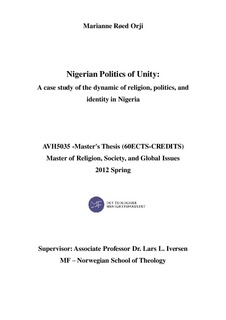Nigerian Politics of Unity: A case study of the dynamic of religion, politics and identity in Nigeria.
Master thesis
Permanent lenke
http://hdl.handle.net/11250/161068Utgivelsesdato
2012-10-02Metadata
Vis full innførselSamlinger
Sammendrag
“Nigerian Politics of Unity” is the title for this thesis as I claim that the “politics of unity” or in other words the “Rhetoric of Unity” can sustain and moreover exacerbate existing tensions. The aim of this thesis has been to expand on the dynamic of religion, politics, and identity, and furthermore how ideas of inclusion and exclusion are expressed. My motivation for posing the questions above was instigated by what I saw as inadequate accounts by previous research within the field of ethnicity in Nigeria. In chapter 2, I therefore gave an overview of previous research and critiques of the instrumentalist approach. I furthermore, pointed to how the contributions of this dissertation by adding that “ethnopolitics” and instrumentalism can be seen as both dynamic and static in the Nigerian case. Drawing on Laclau and Mouffe’s (Laclau and Mouffe 1990; Laclau 1993b) terminology of “floating signifiers”, I account for the choice of discourse analysis applied in ch.5. I established my own typology of Nigerian “positions” as depicted in the “mediascape” of the two newspapers. These positions include “Boko Haram”, “Extreme elements”, “Moderate elements”, and “Nigerian Leaders”. In chapter 5, I implemented discourse analysis on my material consisting of newspaper excerpts. In chapter 6 the findings of the discourse analysis are further discussed in relation to previous scholarly work outlined in ch.2. ’ As outlined in the introduction chapter, I have addressed how these concepts relate to one another by looking at how Nigerians and particularly Nigerian leaders, in their statements, use ethnic identity for their political agendas.
